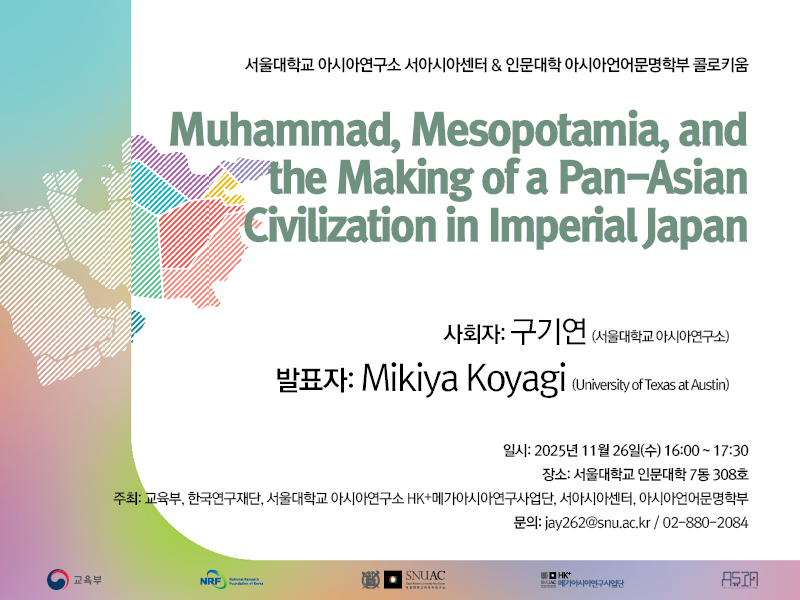서아시아센터는 인문대학 아시아언어문명학부와 함께 The University of Texas at Austin 역사학과 및 중동언어문명학과의 고야기 미키야 교수를 모시고 20세기 초 일본에서 ‘아시아’를 상상하는데 있어 무함마드와 고대 메소포타미아 문명을 어떻게 활용했는지를 조망하는 강연을 개최합니다.
강의소개
Until the second half of the nineteenth century, nobody considered themselves “Asian.” By the turn of the twentieth century, however, this situation had changed drastically, as nationalists from Japan, China, India, Iran, and the Ottoman Empire called for solidarity among Asian peoples. Through the case of Japan, this talk traces how Asia, an external label imposed by Europeans, was reappropriated as a self-referential term among Asians. In particular, I will examine a geographical imaginary that conceptualized Asia as a contiguous civilizational space that stretched from Japan to the Middle East. In their attempt to identify Asia’s civilizational essence, Japanese proponents of this imaginary mobilized globally circulating ideas of race, religion, and civilization. These ideas shaped how they imagined Prophet Muhammad and ancient Mesopotamian civilization as key pieces of evidence that demonstrated Japan’s spiritual and racial sameness with the Middle East.
강연자 소개
Mikiya Koyagi is a historian of the modern Middle East, with an emphasis on the social and cultural history of nineteenth- and twentieth-century Iran. His first book, Iran in Motion: Mobility, Space, and the Trans-Iranian Railway (Stanford: Stanford University Press, April 2021), examines how a state infrastructural project in early twentieth-century Iran redirected provincial, national, and transnational flows of goods, people, and ideas and produced the national space of Iran. He is currently working on two book projects. The first project examines the history of intra-Asian connections since the nineteenth century, with a focus on the interactions between Japan and the Muslim world. The second project is a history of the Indo-Afghan-Iranian borderlands since the nineteenth century.
일시 및 장소: 2025년 11월 26일 (수) 16:00-17:30, 인문대학 7동 308호
사회자: 구기연 (서울대학교 아시아연구소)
발표자: Mikiya Koyagi (The University of Texas at Austin)

